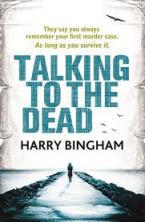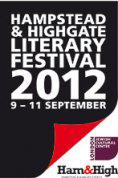 Harry Bingham is the founder of Writers’ Workshop and the York Festival of Writing. He’s also the author of multiple works of fiction and non-fiction, including How To Write and Getting Published, so overall he has a unique overview of the world of books. His crime debut Talking To The Dead is the first in a trilogy featuring detective DC Fiona Griffiths, and according to Harry, the best book he’s ever written. It certainly kept me awake and his weird and highly original protagonist Fiona scared me more than the criminals did. Harry kindly agreed to talk to me about his approach to writing crime.
Harry Bingham is the founder of Writers’ Workshop and the York Festival of Writing. He’s also the author of multiple works of fiction and non-fiction, including How To Write and Getting Published, so overall he has a unique overview of the world of books. His crime debut Talking To The Dead is the first in a trilogy featuring detective DC Fiona Griffiths, and according to Harry, the best book he’s ever written. It certainly kept me awake and his weird and highly original protagonist Fiona scared me more than the criminals did. Harry kindly agreed to talk to me about his approach to writing crime.
What made you ‘turn to crime’ after your success in other genres?
I got involved in an editorial project which required me to read a whole heap of crime novels and think hard about what would make a crime book succeed. From that exercise, I got the germ of an idea, and that idea simply grew on me until I knew I had to write the book. The idea, incidentally, had nothing to do with a plot or a particular story. It was everything to do with my protagonist, Fiona Griffiths. Effectively, she just climbed into my head and has never really let me go.
There are so many clichés associated with male detectives: depression, alcoholism, divorce. With the current vogue for women detectives, do you see similar stereotypes emerging? Did you consciously set out to give Fi Griffiths a trait nobody would dare copy?
I set out to do two things, in fact. One was, I wanted to reverse every stereotype of contemporary detective fiction. The classic detective is middle-aged, reasonably senior, male, boozy, physically imposing or otherwise able to look after himself, divorced & not seeking a permanent relationship, either a smoker or an ex-smoker, etc. Fiona is a young, junior, petite woman who neither smokes nor drinks and tries her hardest to make a go of a new relationship.
And then … well, there’s this mystery about Fiona which, as you say, is quite simply unique. But it doesn’t (I hope) feel contrived. Although this mystery is very strange, it IS a real condition and it has to do with the life/death mysteries of detective fiction. As soon as I had the idea, I knew it was the right one.
Why did you pick a woman? What was it like writing the opposite sex in the first person?
I chose a woman partly to reverse those stereotypes, but also because I wanted my detective to look from the outside like the least important, least weighty officer in the country. So: young not old, junior not senior, petite not burly, provincial not metropolitan … and a woman.
As for writing as a woman – well, the most remarkable thing about Fiona is hardly what gender she is – and shifting sex certainly wasn’t the biggest imaginative leap I had to make. And in any case, she just came and took me over. All I really had to do was give her the pen and let her write.
Sales of crime fiction have rocketed in recent years and no genre except romance even comes 
I think crime never forgets that it has to entertain the reader. If you mix that with strong writing, you have a wonderful book. And then of course nearly all fiction has to touch some kind of extreme. If it didn’t, why would we read it?
In places, TTTD contains unusual violence and graphic scenes. Have you personally been influenced by Scandinavian crime fiction which is notorious for this?
Hmm. I’d say that TTTD doesn’t have any very nasty “on-screen” violence. I hate the kind of voyeuristic writing you get in some crime fiction and there’s none of that in TTTD. What there is, I think – and this is true of the better Scandi fiction too – is a sense of darkness. But you don’t need to be very graphic to achieve that. What you have to do is explore difficult themes with honesty and write with truth and a preparedness not to look away.
For me, crime plots are often confusing and impossible to follow, but yours wasn’t. As the writer, how do you keep a handle on how much is too much?
It’s hard to know! TTTD wasn’t very heavy on the mystery, in large part because there was so much else going on – notably the whole mystery of Fiona Griffiths herself. But I also feel that too much mystery feels unrealistic. In the end, police investigations do travel on easily understood lines. Personally, I like a degree of complexity which forces readers to think … but that’s not the same as causing brain ache.
TTTD demands some fundamental suspension of disbelief. In fiction generally, what makes readers willing to buy into that?
All books do, don’t they? There’s one major leap of faith you have to take with Fiona: could anyone with her past actually end up being the person she is? The realistic answer is probably not.
Getting the reader to travel with you is (for me) all about the strength of the voice and the quality of the writing. Fiona has such a strong voice – a commanding voice really – that I think she takes you to places which you might not otherwise reach. And then of course reality is often odder than we think it. Fiction only ever chases in the slipstream.
Writers in other genres are often told their novel must be packed with action and suspense to stand a chance of publication. Do you think the rise of crime fiction has affected readers’ taste generally?
I don’t think that’s quite true about other genres. I think writers need to entertain and grip the reader: and quite right too. They also need a hook, some angle of approach, which feels new and compelling. But those are good things to demand of any writer. If crime has played its part in that, then wa-hay for crime.
Is it any easier or harder to get a break as a new crime writer than in other genres?
Harder, I would think. There are a lot of well-established writers already and UK publishers have a pretty much endless source of quality supply from the US. So publishers are certainly taking on debut crime, but the standards are testingly high.
The most gripping aspect of TTTD was Fiona herself and what is ‘wrong’ with her. How will you sustain the tension in books 2 and 3 once the reader knows?
Ha, ha! Mine to know and yours to wonder …
Well, I can’t wait to find out! Thanks, Harry for these fascinating insights and for being such an entertaining guest.
If you read or write crime I’m sure you have your own take on what we’ve been discussing and I’d love to hear it.
*EVENT NEWS*


